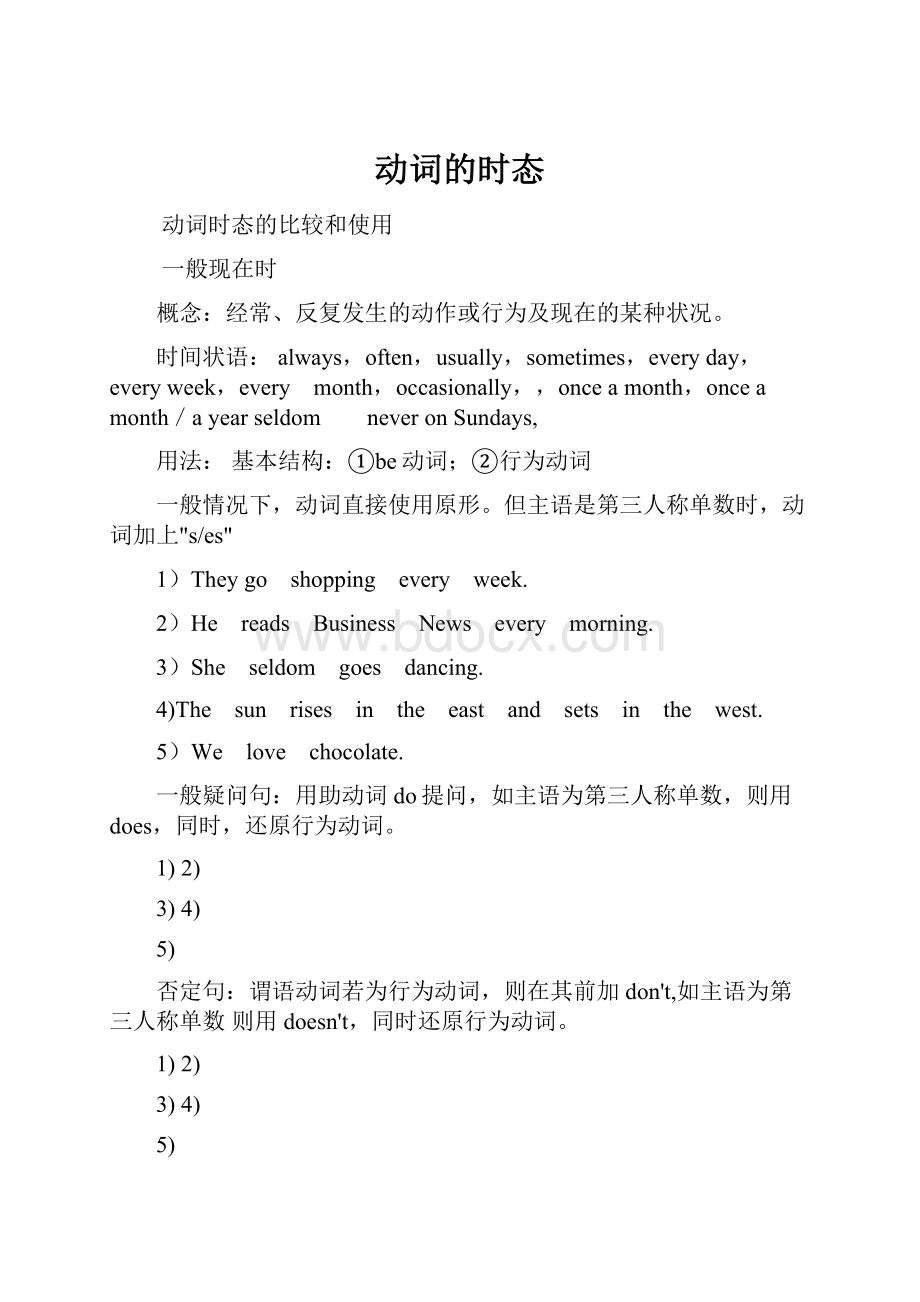动词的时态.docx
《动词的时态.docx》由会员分享,可在线阅读,更多相关《动词的时态.docx(50页珍藏版)》请在冰豆网上搜索。

动词的时态
动词时态的比较和使用
一般现在时
概念:
经常、反复发生的动作或行为及现在的某种状况。
时间状语:
always,often,usually,sometimes,everyday,everyweek,every month,occasionally,,onceamonth,onceamonth/ayearseldom neveronSundays,
用法:
基本结构:
①be动词;②行为动词
一般情况下,动词直接使用原形。
但主语是第三人称单数时,动词加上"s/es"
1)Theygo shopping every week.
2)He reads Business News every morning.
3)She seldom goes dancing.
4)The sun rises in the east and sets in the west.
5)We love chocolate.
一般疑问句:
用助动词do提问,如主语为第三人称单数,则用does,同时,还原行为动词。
1)2)
3)4)
5)
否定句:
谓语动词若为行为动词,则在其前加don't,如主语为第三人称单数则用doesn't,同时还原行为动词。
1)2)
3)4)
5)
b).表示一种状态或性质
1)Thiscake tastes very good. 2)I don’t believe my eyes.
3)Theyareverysmart 4)Sheisveryhappy
一般疑问句
1)2)
3)4)
变否定句
1)2)
3) 4)
5)
动词三人称单数的构成
1__________________________________2__________________________________
3__________________________________4___________________________________
5__________________________________
Exercises:
一。
用词的适当形式填空
1.Mike________(be)goodatdrawingpictures.
2.When_______you________(get)upeveryday?
3.We________(plant)treesinspringveryyear.
4.Lilyusually_________(ride)abiketoschool.
5.MrsWhiteusually________(have)lunchathome.
6.Heoften__________(watch)TVonSaturdayandSunday.
7.Winter_________(come)afterautumn.
8.When________youmotherusually__________(get)upinthemorning.
9.Everyone___________(get)tiredsometimes.
二。
句形转换。
1.Thetrainstartsatteno'clockinthemorning.
(1)变一般疑问句:
____________________________________?
(2)对划线部分提问________________________________________?
2.Mygrandpadoessportseveryday.
(1)疑问句:
_____________________________________?
(2)否定句:
______________________________________.
3.Thereisabookandtwopencilsonthedesk.
(1)疑问句:
_____________________________________?
(2)否定句:
______________________________________________
4.Therearetwocupsofteaonthetable.
(1)对two提问___________________________________?
(2)对twocupsoftea提问_____________________________________________?
5.HeoftenwatchesTVatnight.(划线提问)
________________________________________________?
6.Nickplaystenniswithhermother(划线提问)
____________________________________________________?
现在进行时:
表示现阶段或说话时正在进行的动作及行为。
时间状语:
(right)now,atthe(this)time,thesedays,etc.at presentatthe/this moment ,
涉及的动词:
look,listen
基本结构:
be(is/am/are)+doing
否定形式:
am/is/are+not+doing.一般疑问句:
把be动词放于句首。
肯定句
(1)Robert___________ (teach) at this moment。
(2)They____________ (work) on the first draft of their essays。
(3)I____________ (look)for my umbrella right now.
(4) He______________(enjoy) a holiday now.
否定句:
(1)_____________________________
(2)________________________________
(3)_________________________________(4)__________________________________
疑问句
(1)___________________________
(2)__________________________________
(3)______________________________________(4)___________________________________
现在分词的构成。
1._____________________________2._____________________________
3.______________________________4.______________________________
**注意**_____________________________
Exercises:
一用词的适当形式填空1.We____________(work)onafarmnow.
2.Listen!
someone__________(knock)atthedoor.
3.Look!
thechildren_____________(run)ontheplayground.
4.It______________(rain)now.
5.Somestudents_____________(climb)thehillnow.
二。
句型转换1.Theyarehavingagoodtimenow.(一般疑问句)____________
2.Sheisdrawingapicture.(划线提问)__________________
3Heisplayingtennisatthemoment.(划线提问)__________________
4.WearewatchingTV.(划线提问)_______________
一般将来时。
概念:
表示将要发生的动作或存在的状态及打算、计划或准备做某事。
时间状语tomorrow,thedayaftertomorrownextday(week,month,year…),soon,inafewminutes,intwodays,inthefuture…等将来的时间。
结构1will+动原(用于各种人称)
(1)Iwillgotomyhometownnextweek.
(2)WewillcometoseeyounextSunday.
(3)Youwillcleanuptheclassroom,won’tyou?
(4)Shewillstudyforatestthisweek.
(5)Theywillstudyingroups.(6)Therewillbeameetingthedayaftertomorrow.
疑问句:
把will提前
(1)___________________________
(2)___________________________________
(3)_________________________________(4)
(5)(6)____________________________________
否定句will后加not,缩写为won't
(1)___________________________
(2)___________________________________
(3)_________________________________(4)
(5)(6)____________________________________
2.shall+动原(用于I/We)
(1)Weshallmeetalittleearliertomorrowmorning?
(2)Ishallwriteyoualetternextmonth.
疑问句:
把shall提前
(1)___________________________
(2)___________________________________
否定句shall后加not,
(1)___________________________
(2)___________________________________
3.begoingto+动原(用于各种人称)
(1)They'regoingtomeetoutsidetheschoolgate.
(2)We'regoingtohavesomeclassesnextweel\k.
(3)Sheisgoingtomakesomeflashcardsthisweekend.
(4)HeisgoingtostartanEnglishclub.
疑问句:
把be提前
(1)___________________________
(2)___________________________________
(3)_________________________________(4)
否定句be后加not
(1)___________________________
(2)___________________________________
(3)_________________________________(4)
4表示趋向行为的动词如come、go、start、begin、leave等词常用进行时的形式表示将来时
(1)Iamcominginaminute.
(2)TheyareleavingforBeijingtomorrow.
④begoingto与will/shall,用法及区别:
begoingto表示现在打算在最近或将来要做某事,这种打算往往经过事先考虑,甚至已做了某种准备
shall/willdo表示未事先考虑过,即说话时临时作出的决定。
begoingto表将来,不能用在条件状语从句的主句中;而will则能,表意愿。
如:
Ifitisfine,we’llgofishing.(正确)
Ifitisfine,wearegoingtogofishing.(错误)
Exercise:
一用词的适当形式填空
1。
MyfriendsandI_________(watch)thefootballmatchthisevening.
2She_____________(nothave)lunchatschoolnextTuesday.
3_______Lily_______(work)hardatEnglishthisterm?
4What_______you-________(do)tomorrowmorning?
5There__________(be)danceinourschooltomorrow.
6Mike___________(see)menextweek.
7I__________(see)adoctorthisafternoon.
8Lookatthoseblackclouds,it________(rain)
9Theradiosaysit________(rain)thedayaftertomorrow
10Sally___________(be)adoctorinfiveyears
二句型转换
1Therewillberobotsinpeople'shomesin10years.(否定句)
_________________________________________________
2TheboyswillhaveafootballmatchthisSaturday.(疑问句)
__________________________________________
3Therewillbeanewfilminthecinemanextweek.(划线提问)
_____________________________________________________
4TheywillgotothezoothisSunday..(划线提问)
_____________________________________________________
5SheisgoingtodosomeshoppingnextThursday.(划线提问)
_____________________________________________________
一般过去时
概念:
过去某个时间里发生的动作或状态;过去习惯性、经常性的动作、行为。
时间状语:
ago,yesterday,thedaybeforeyesterday,lastweek(year,night,month…),in1989,justnow,attheageof5,oneday,longlongago,onceuponatime,etc.
基本结构:
①行为动词;②be动词
②否定形式:
⑴was/were+not;⑵在行为动词前加didn't,同时还原行为动词。
一般疑问句:
①was或were放于句首②用助动词do的过去式did提问,同时动词还原
一表发生在过去的动作,肯定句直接使用动词的过去式
(1)Imetherinthestreetyesterday.
(2)Sheoncesawthefamousstarhere.
(3)Theyneverdrankwine.(4)Hedidhishomeworkjustnow.
否定句
(1)_______________
(2)_________________(3)_________________(4)_________________
疑问句
(1)_______________
(2)_________________(3)__________________(4)_________________?
二be动词表过去的状态
(1)Iwasawayyesterday
(2)Theywereallherethedaybeforeyesterday.
(3)Therewasabookandtwoerasersonthedaskjustnow.
(4)Therewerethreepeopleinourbandlastyear.
否定句
(1)______________
(2)______________________________
(3)______________________________(4)______________________________
疑问句
(1)______________________________
(2)_______________________________
(3)_______________________________(4)________________________________
如果的为主从句,主句和从句的时态保持一致
Hetoldmehereadaninterestingnovellastnight.
表示两个紧接着发生的动作,常由以下词语连接,用一般过去时。
如:
but,and,when,assoonas,immediately,themoment,theminute。
Themomentshecamein,shetoldmewhathadhappenedtoher.
Heboughtawatchbutlostit.
规则动词的过去式的构成:
(1)______________________
(2)________________________
(3)________________________(4)________________________
(5)__________________________
Exercises1.It_________(rain)alotlastyear.
2.We_____________(live)inthesouthwhenIwasachild.
3Thetwins______________(notgo)toschoolyesterday.
4Father_______________(come)backaweekago.
5When_________theSecondWorldWar_____________(end)
6Who________(tell)youthatstory?
7I____________(hear)thegoodnewsjustnow.
8___________you______________(go)tothecinemalastnight.
9They___________(notsurf)theInternetlastweek,becausetheyhadalotofhomeworktodo.
10Where_______they_______(put)theirbook?
句型转换1.AlicewenttoChinalastyear.
否定句____________________________.疑问句____________________________?
2.Hevisitedhisgrandparents.(划线提问)________________________________?
3Theydidtheirhomeworkyesterday.
否定句______________________________.疑问句_____________________________?
4Sheplayedpingpongjustnow(划线提问)______________________________________?
5.TheGreenfamilyarrivedthreedaysago.(划线提问)_____________________________________?
过去进行时:
概念:
表示过去某段时间或某一时刻正在发生或进行的行为或动作。
时间状语:
atthistimeyesterday,atthattime/moment.,at7o'clockyesterday或以when引导的谓语动词是一般过去时时间状语等。
基本结构:
was/were+doing
1SandywaswatchingTVat9o'clocklastnight.
2Weweredoinghishomeworkatthattime.
3ShewasplayingcomputergameswhenIsawher
4Theyweremakingtelephonecallsatthistimeyesterday.
否定形式:
was/were+not+doing.
1____________________________________2_____________________________________
3______________________________________4_____________________________________
一般疑问句:
把was或were放于句首。
1____________________________________2________________